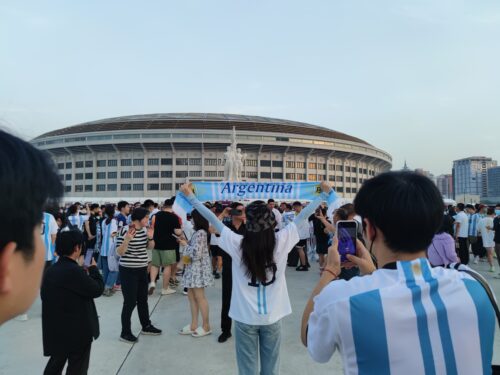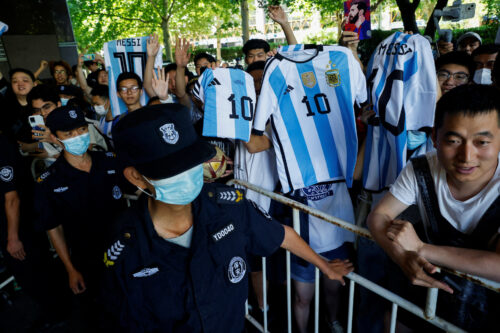China’s best football team gets unfavorable World Cup draw


The China Sports Column is a The China Project weekly feature in which China Sports Insider Mark Dreyer looks at the week that was in the China sports world.
China was the first team to qualify for next year’s Women’s World Cup — apart from hosts France — but that hasn’t granted them any favors in the draw for the competition. The No. 15 ranked Steel Roses will play against No. 2 Germany and No. 12 Spain in Group B, alongside the No. 48 ranked South Africans. Although four of the six third-place teams in the tournament’s group stage will qualify for the knockout stage, anything less than topping Group B would see China face another group winner in the Round of 16.
In contrast to their male counterparts, who have only played in one World Cup, China’s women have only missed one World Cup, and they finished runners-up in 1999.
But if they are to progress deeper into the tournament, much will depend on the form of attacking midfielder Wang Shuang 王霜, who has just been named the Asian Football Confederation Women’s Player of the Year. Earlier this year, Wang moved to French side Paris Saint-Germain, where she has quickly settled, with PSG engaged in their perennial battle with Lyon at the top of France’s Division 1 Féminine — ranked by UEFA as the second strongest league in Europe — and already through to the quarterfinals of this season’s Champions League.
At 23, this is already Wang’s second stint playing overseas, having starred in the Korean league as a teenager, and if Wang can continue scoring goals and soaking up some local knowledge across France, then — maybe — by the time China plays in Rennes, Paris, and Le Havre next June, the Steel Roses can put together a run of form that carries them deep into the tournament.
There is one potential drawback, though.
Chinese media have this week been touting the appointment of so-called “devil coach” Kim Chang-back — a Korean, best known for his work with the Chinese field hockey team in 2008 — as a strength and conditioning expert. With military-style training en vogue for China’s men’s squads, too, the powers that be have clearly decided that this should be implemented more widely.
But with overtraining a scourge of Chinese athletes across all sports — even if it has produced a few robotic Olympic champions — Wang Shuang would be best advised to stay well away from this new regime if she wants to continue being one of the best players in the world.
~
To much disagreement from my editor, this columnist has previously predicted that MLB may feature more mainland Chinese athletes than any of the other Big 4 U.S. sports over the next decade or so. Well, the league has now chosen the man who will lead that effort.
Former data company Nielsen executive Steven Li will head up operations in China, with his abilities to analyze the market, plus his strength in media cooperation, cited by Jim Small, VP for Asia at MLB, as reasons for his hiring. Li has also spent time with Intel, Microsoft, and Sina, but his most recent stint as VP of Business Development at NBA China — long viewed as the gold standard of international sports leagues in China and now valued at $4 billion as a standalone entity — would no doubt have been viewed as a key factor by sports recruitment company SRi, who placed him in this role.

After entering the Chinese market in 2007, MLB now has development centers in Wuxi, Changzhou, and Nanjing, and while none of their alumni has yet made their major league debut, there has been a steady stream of players signing with MLB teams in the U.S.
Meanwhile, on the business side, Li will look to build on a key content deal signed this year with Tencent — now the undisputed home of U.S. sports in China — as he and his team look to expand on that platform and take the sport to the next level here.
~
China has never been viewed as one of very best swimming nations — excepting, of course, the juiced (and later disgraced) Chinese women squad that dominated in international competition in the early 90s — but it’s often threatened to make a breakthrough into the top tier.
With stars like Sun Yang 孙杨, Ning Zetao 宁泽涛, and Fu Yuanhui 傅园慧 achieving mainstream success — both in and out of the pool — in recent years, there’s been genuine hope that swimming could prove fertile ground for China’s sporting future.
Sun’s name appeared on the initial entry list for the ongoing FINA Short Course (SC) Championships in Hangzhou, but he rarely races in the 25m pool in international competition and wasn’t featured on the final entry lists for individual races in Hangzhou, though he did help the Chinese 4x200m freestyle relay team set an Asian record en route to a bronze medal.
With two more days of competition remaining, Wang Shun 汪顺 and Wang Jianjiahe 王简嘉禾 have been the golden performers for China, with Wang Shun retaining the 200m individual medley title he won at the 2016 SC Championships in Windsor, Canada, while 16-year-old Wang Jianjiahe followed her four gold medals at the Asian Games in Indonesia earlier this year with gold in the women’s 800m freestyle and silver in the 400m in Hangzhou.
Saturday’s race of the day could come in the men’s 400m individual medley, when the home crowd will cheer Wang Shun on in his bid for a second gold against Japan’s Daiya Seto, who is looking to win his fourth straight title at this distance despite still only being 24. Seto is also in ominous form, having set a world record in the 200m butterfly earlier this week.
The U.S. has dominated the medal table in Hangzhou with 10 gold medals so far, but with some of China’s biggest names — including Sun Yang and perhaps even 2012 double Olympic champion Ye Shiwen 叶诗文 — set to return for the World (Long Course) Championships in Korea next summer as well as the 2020 Tokyo Olympics, China will hope it can make some inroads into the more traditional swimming territories.
The China Sports Column runs every Friday on The China Project. Follow Mark Dreyer @DreyerChina.







